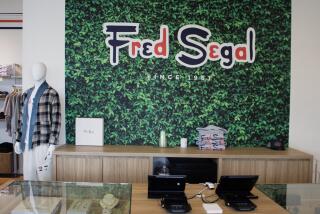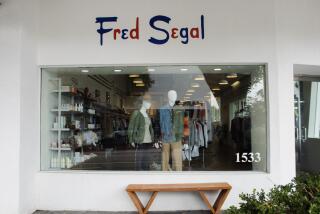A vibrant L.A. chapter will end when Dutton’s closes
The closing of a single bookstore in L.A. is not likely to alter the course of events or intrude on the city’s rhythms of life.
There will be no sharp increase in suicides among writers due to its closure or a sudden drop in IQs among readers.
The days will continue as before, with a mix of sunshine and rain, and a wind that sometimes blows out of the northeast. Birth and death will occur at their regular pace.
And yet the disappearance of Dutton’s bookstore at the end of April will create a cultural gap not just in Brentwood but in a city that loves books.
For 23 years, Dutton’s has been a gathering place for writers, thinkers and readers, a forum for those whose imaginations roam the far landscapes of human experience.
Thousands of authors from across the country, and often around the world, have introduced their books there. Their fans have lined up for hours to hear them talk, to buy their books and to have the books signed.
The expansive stone courtyard embraced by three segments of the store has hosted gatherings of the literati that few places in L.A. allow: Readers and writers have gotten to know each other in the kindly ambience of a garden.
Owner Doug Dutton announced the closing last Monday to the dismay of many from coast to coast. Burdened by debts from an ill-fated venture in Beverly Hills and uncertain about the future of the building he occupies, Dutton decided to call it quits.
“I could have gone on for another 20 years,” he says as we sit on a bench in the courtyard, surrounded by planters of palms and ferns. The day glows with the crisp brilliance of an early spring, not at all the time to talk about the failure of ideas.
At 60, he was never planning the demise of Dutton’s. An inventory of 750,000 books is piled high around aisles that are protective canyons, emitting auras of warmth and invitation. One touches the walls that the books create. This is a place of peace and quiet and of events that occur out of place and out of time.
A trim and almost Hollywood-handsome man, Dutton was raised among books in a North Hollywood store owned by his parents, who opened it in 1961. His brother David operated the store until it was closed two years ago.
“There is nothing like a bookstore,” Dutton is saying, in a mood to reminisce. We joke about hardware stores and bars coming close in terms of appeal and atmosphere, but then the moment shifts again to reality, and he says very quietly, “I never wanted to leave the business. I’m proud of what we’ve done here. But we just couldn’t go on any longer.”
He is still thinking that maybe there’s a place somewhere for a new Dutton’s to emerge, perhaps in the very complex that will replace the present two-story structure now housing the bookstore and some upstairs offices. If not, maybe in Culver City. Maybe.
As an author who has introduced new books at Dutton’s -- sometimes to large crowds, sometimes to no one -- I have very personal feelings about this particular store. It isn’t the only game in town, but Dutton, by his welcome, has given it a special nature, turning it into an integral part of L.A.’s writing family. We are home at Dutton’s.
Over the years, I have seen two other small independent bookstores go under. One was the imaginative Change of Hobbit, which hosted a collection of 25,000 volumes of fantasy, science fiction and horror. Ray Bradbury signed books there; so did Stephen King.
The other was the Midnight Special, a meeting place on Santa Monica’s Third Street Promenade for those who read more to be informed than to be entertained. Few conventional bestsellers were hustled there.
It was a place where counterculturists like Paul Krassner spoke, stoking the fires of social unrest as he had in the 1960s, turning laughter into a thought process. The store tried to reopen elsewhere but the old magic was gone, and very soon it was gone too.
Special things exist in special times, seeming to emerge on cue to fill a need and to imprint their presence on the body politic of a culture. I doubt that Doug Dutton and his family before him ever intended to create an institution, but in a way they did, and we all have benefited by the existence of the special little store that will soon be gone.
The author R.D. Cumming said, “A good book has no ending.” But one is forced to observe that the shops of commerce do have life spans. Even bookstores die.
almtz13@aol.com
More to Read
Sign up for our Book Club newsletter
Get the latest news, events and more from the Los Angeles Times Book Club, and help us get L.A. reading and talking.
You may occasionally receive promotional content from the Los Angeles Times.







